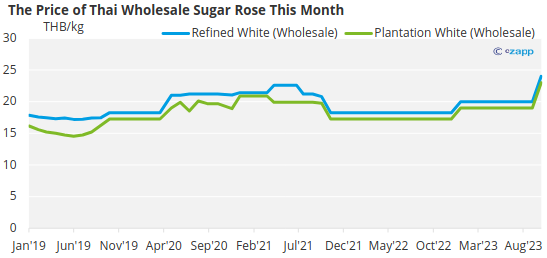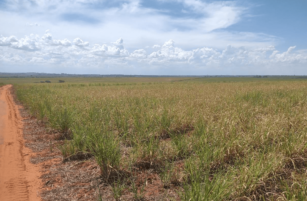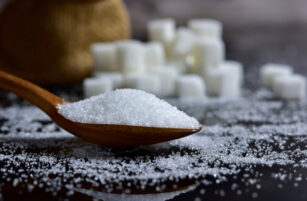Insight Focus
- The price of domestic sugar increased by THB 4/kilogram.
- The Thai government has decided to categorize sugar as a controlled good.
- This has the potential to impact the cost of living for many Thai households.
What Happened to Thai Domestic Sugar?
In a surprising turn of events for Thailand’s sugar industry, the government increased the domestic sugar price in late October. The price of sugar increased by THB 4/kilogram, raising eyebrows among consumers and industry stakeholders.
Plantation white sugar is now THB 23/kilogram, while refined white is priced at THB 24/kilogram.

In addition, the Thai government classified sugar as a controlled good. This move aims to mitigate the impact of rising sugar prices on consumers and stabilize the domestic market. This will also bring with it additional government oversight and regulation to the sugar market and signifies that sugar prices are now subject to government intervention.
Sugar Price Surges
The sudden and substantial increase in sugar prices can be attributed to various factors. Some of these are:
- Weather Conditions: Unpredictable weather patterns, including irregular rainfall and extreme weather due to El Nino, can adversely affect sugar production. Such conditions have led to a decrease in cane yields, which in turn has disrupted the supply of sugar and impacted pricing.
- International Market Dynamics: The global sugar market is intricately connected, with prices influenced by international supply and demand. A drop in sugar production in major producing countries or an increase in global demand can directly affect domestic sugar prices.
- Exchange Rates: Fluctuations in the Thai Baht’s value relative to other currencies can also have an impact on sugar prices. Exchange rate shifts can influence the import and export of sugar, thereby affecting local prices.
Stakeholder Implications
- Consumers: The increase in sugar prices will be immediately felt by consumers, who may see the cost of common food and beverages rise. This has the potential to impact the cost of living for many Thai households.
- Cane Farmers: On the other hand, the increase in sugar prices may benefit sugar cane farmers, offering them a chance to increase their income and improve their financial stability.
- Government: The government will now have the responsibility of monitoring and regulating sugar prices. This decision reflects the government’s desire to maintain the stability of essential commodity prices for the public.
Concluding Thoughts
The surge in Thai domestic sugar prices in October, coupled with the addition of sugar to the controlled goods list, presents a complex challenge for both consumers and the sugar industry.
Finding a delicate equilibrium that safeguards the interests of all stakeholders while ensuring the stability of the sugar market is of paramount importance.
A combination of effective monitoring, government support, and a commitment to transparency will be vital in navigating these developments and ensuring the sustainability of the sugar industry in Thailand.














